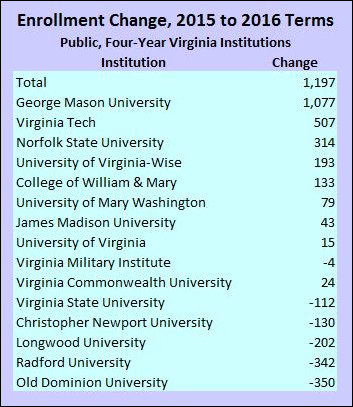
More empty desks as college enrollment declines for fifth straight year.
College enrollment declined in the fall of 2016 for the fifth straight year. Student count fell nationally 1.9% to 16.3 million, reports the Wall Street Journal.
The for-profit sector was hardest hit — a 14.5% decline — as older students, who tend to take vocational courses requiring more flexible hours, headed back to the workforce. Four-year private, non-profit colleges suffered a 0.6% decline, with the fall-off concentrated among smaller institutions.
Public four-year colleges fared better. They squeaked out a 0.2% gain in enrollment to 8.1 million students.
The article cited rising tuition as a major factor behind the dipping college enrollment:
“The trend of [tuition] prices continuing to rise faster than inflation is beginning to have more and more of an impact” on enrollments, especially among low-income and first-generation students, said Jamie Merisotis, president and chief executive of Lumina Foundation. … Affordability concerns are outweighing projections about the economic benefits of a college education.
 Virginia’s public four-year colleges slightly out-performed the national averages, increasing enrollment 0.56% overall, according to State Council for Higher Education in Virginia (SCHEV) data.
Virginia’s public four-year colleges slightly out-performed the national averages, increasing enrollment 0.56% overall, according to State Council for Higher Education in Virginia (SCHEV) data.
But George Mason University accounted for that full increase almost single-handedly. Several institutions lost students, most notably Old Dominion University and Radford University. It is dangerous to draw conclusions from a single year’s performance, which could have any number of possible explanations. But it’s a warning sign if an institution consistently loses students over several years.
Bacon’s bottom line: The higher ed industry touts the higher average earnings of college graduates as justification for getting a degree. But the average includes graduates from a broad spectrum of institutions from Harvard to Podunk U. If Harvard grads are earning more than average, someone is earning less than average. Students whose academic achievement was weaker in high school have every reason to fear that their earnings will be on the low side of average and every reason to take a hard look at the financial return on their time and investment. Plenty of semi-skilled, blue collar occupations provide a good living without the need for big student loans.


